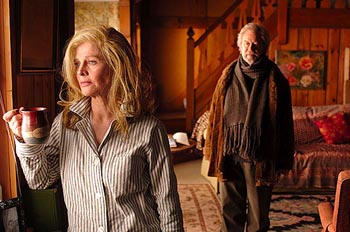Don’t even think about seeing Away from Her unless you’re prepared to 1) cry your eyes out and 2) have your cultural stereotypes about marriage shattered to pieces.
As beautiful as ever, and radiantly no-longer-young, Julie Christie illuminates the  broken heart of this deeply affecting film, as a woman entering the twilight of dementia. But before the film even unpacks its considerable candor about the loss of memory, it transforms itself into a transcendent portrait of love.
broken heart of this deeply affecting film, as a woman entering the twilight of dementia. But before the film even unpacks its considerable candor about the loss of memory, it transforms itself into a transcendent portrait of love.
It took me an hour to compose myself after I walked out of the Nickelodeon last weekend (take kleenex and dark glasses!), but once I was able to focus again I realized I’d just seen something breath-takingly rare — a film about the distilled quality of a long love directed by a woman still in her 20s.
Co-starring Gordon Pinsent and Olympia Dukakis (in a searing and unexpected performance), Away from Her opens with a few quirky moments in which lovely Fiona Anderssen (Christie) may or may not be slipping into Alzheimer’s. Set in snowy Canada — indeed with the exception of Dukakis, the entire cast, crew and setting are Canadian – the film observes the difficult moments of recognition, acceptance, and then non-acceptance between the long-married husband and wife as to her condition. Based on a short story by Alice Munro, the script is a tissue of exceptional clarity — and it just stretches to feature length, thanks to the letter-perfect casting and hands-off directorial style of writer/director Sarah Polley.
Christie was always a beauty, back in the 60s and 70s when her incandescent face and generous mouth made her an international sex symbol. But I never thought her much of an actress. This film proves that she is, as she allows her beauty to surrender to her character’s age and perplexity. As her husband Grant, reliable character actor Pinsent uses his eloquent eyes to register every acceleration of his heartbreak.
The film is shot like a late Bergman film – I was reminded of both Sarabande and Scenes from a Marriage — with its vignettes of conversation, or silent scenes of skiing, or Christie glancing up at her husband as he visits her in the “home.†She seems not to know him on most of his visits — or is she only feigning? Working with intersecting time frames, to mimic the tangled memory of Alzheimer’s sufferers perhaps, director Polley unwinds more and more details of the early marriage of Grant and Fiona. In his days as a college professor, Grant had dalliances that have lingered – cruelly – in Fiona’s memory. While more recent moments of love and affection between them are beginning to fade and disappear. “I feel as though I’m disappearing,†she even says, one night as she discovers she cannot remember the word for wine. This is not a feel-good, Hallmark trivialization of growing old. But it isn’t what you expect from a film about a marriage in which one partner shows signs of having Alzheimer’s.
What most impressed me about this movie – other than the precocious insights of its young director about love, marriage and a harrowing affliction — was that it might be seen as a gentle film about Alzheimer’s. Yet it isn’t mainly that at all. And it might be expected that with Christie in the lead, the film will belong to her and to the love between her character and Pinsent’s. Yet it doesn’t. Olympia Dukakis steals the film.
You will remember Christie’s face. But you won’t forget what Dukakis’ “play it as it lays†intelligence reveals about the resiliency of love in the face of fate and fortune. She is insistent, strident and yet funny and frank. As Christie and Dukakis’ husband strike up a strangely close relationship in the “rest home,†Christie’s husband and Dukakis form an unusual alliance that ends up providing both the surprise and profound sadness stalking the entire film. Especially as it ends. Dukakis is somehow the unquenchable need to grab life while you still can. And she’s searingly good. Away from Her is even better.
And if the sound of K.D. Lang singing Neil Young’s “Helpless,†doesn’t leave you helpless as the credits roll, you might want to check your pulse. Here’s how good love can be — even with a broken heart. – now showing at The Nickelodeon – 426-7500.

